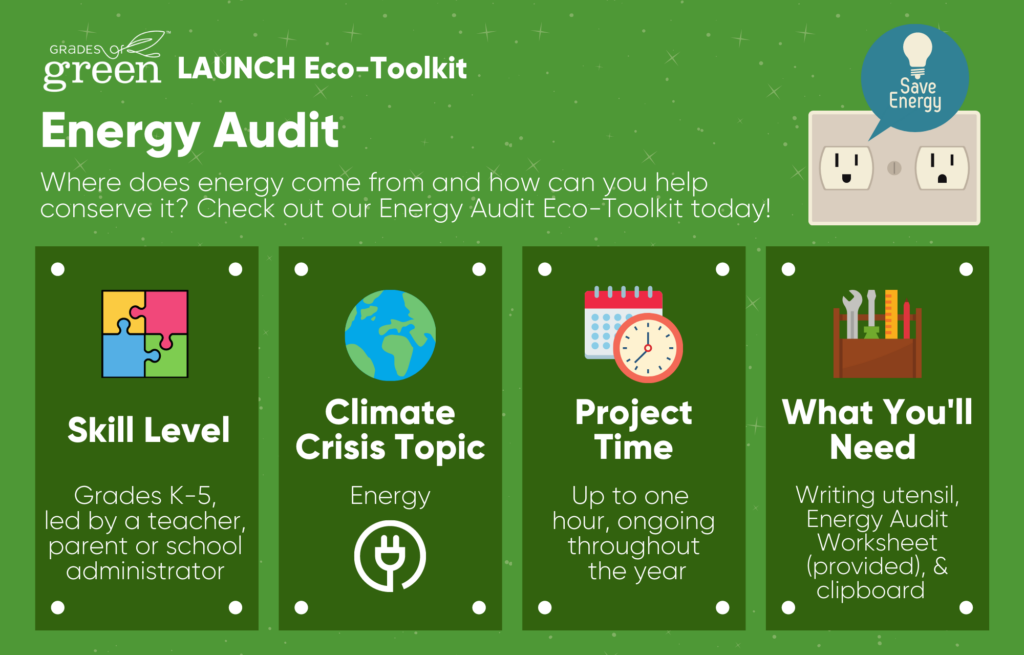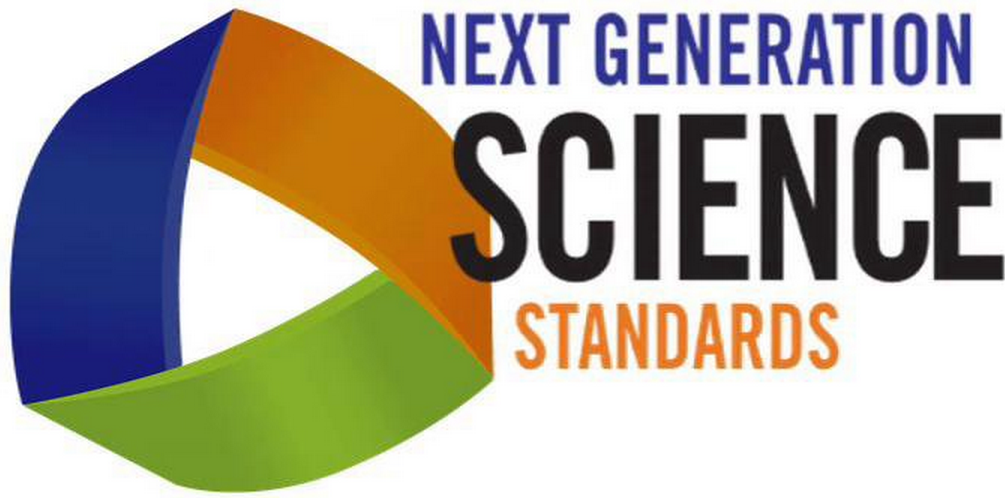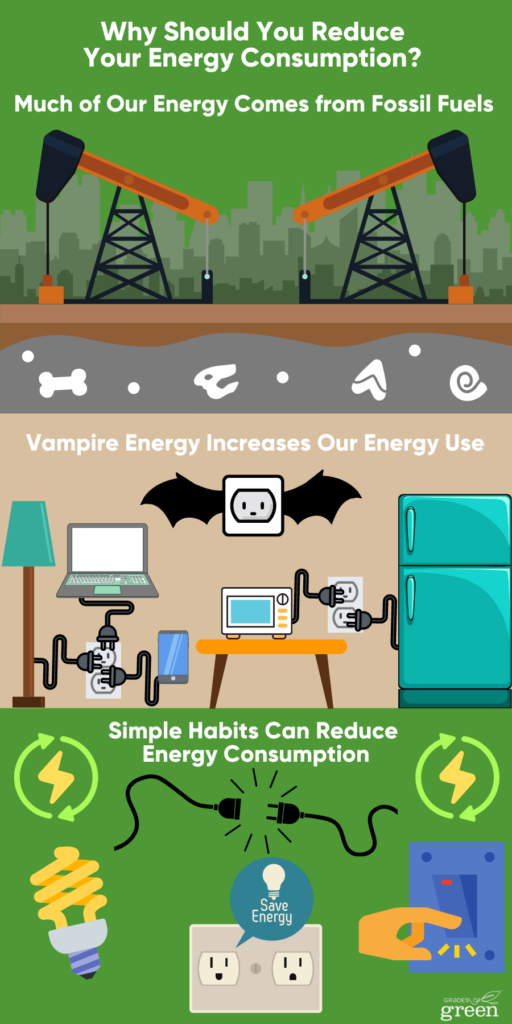Slay the energy vampires at your school by doing an Energy Audit!
An energy vampire is a device that continues to use energy and drain power, even when it is turned off. Use this toolkit to discover where energy is being wasted and what can be done to help stop climate change and (bonus!) save money.

Toolkit Details


NGSS
This toolkit address the following Science and Engineering Practices (SEPs) within the Performance Expectations of NGSS for Grades: K-2 and 3-5
- Asking Questions and Defining a Problem
- Planning and Carrying out Investigations
- Analyzing and Interpreting Data
- Using Mathematics and Computational Thinking
- Constructing Explanations and Designing Solutions
- Obtaining Evaluating, and Communicating Information
Learning Objectives
- Analysis
- Students will analyze a classroom/school building(s) for energy use
- Project Management
- Students will practice collection, analysis, and presentation of data
- Students will create schedules to conduct audits
- Students will exercise effective communication and accountability
- Evaluation and Assessment
- Students will track and evaluate the information they have collected
Why It’s Important
Using too much energy can harm our planet and cause climate change. It is also a big waste of money, which is important because schools need money for their programs and students.
What You Will Accomplish
- Students will become more aware of where energy comes from and look out for energy drainers in their environment.
- Students will learn about renewable vs. non-renewable energy.
- Students will study ways to save energy and by unplugging appliances that do not need to be plugged in while not in use.
Educator Project Plan
Follow the steps below to set up a successful Energy Audit at your school! Need help? Contact us!
Track your progress and submit your impact after implementing this toolkit. Your feedback helps keep our programs free for all across the globe.
Choose Participants
Use our Energy Audit Sign-Up Sheet Template
- A Student Group such as (a club, before/after school program, non-school organization)
- A whole class
- The whole school
- Working with a small group of students (1-6 students)? Start with a single classroom audit
- Working with a larger club/class (6 – 24 students)? Split up into teams to audit different classrooms OR create a schedule to audit the same classroom on a weekly basis
- Is your whole school participating? Split up into teams by classroom or grade level and audit your entire campus
Why Should You Reduce Your Energy Use?
The resources provided can be shown as a slideshow or printed out as individual worksheets for students to learn.

Our Energy Comes from Fossil Fuels
Today, energy sources such as oil, coal, and gas make up 80% of our energy use. They are called “fossil fuels,” and their use often releases chemicals and greenhouse gasses into the air. This causes air pollution and makes the air hotter, which is called global warming. [1]
Vampire Energy
When an appliance is plugged in, it still uses energy, even if it’s not turned on. This kind of secret energy sucking is called Vampire Energy. Studies have found that vampire energy use accounts for 5-10% of the total electricity in residential homes and accounts for about 1% of the world’s carbon dioxide emissions. Appliances can be anything from a lamp, fridge, or an electric pencil sharpener. Some of these appliances have to be plugged in and turned on all the time, but there are others that can be turned off. [2]
Simple Habits Can Lower Energy Use
It’s easy to save energy and lower pollution from fossil fuels. Some small changes include:
- Unplugging appliances when you’re not using them
- Using power strips that can be turned off at night
- Replacing incandescent light bulbs with LED light bulbs
- Put in motion activated light switches
Why Energy is a Social Justice Problem
Using energy relates to environmental justice due to our reliance on fossil fuel consumption. The production, use, and extraction of fossil fuels have numerous consequences on the environment they occupy. Areas where fossil fuels are extracted and processed are called “sacrifice” zones because the health and well-being of the local people and the environment are sacrificed in order to access the fuel. The residents that occupy “sacrifice” zones are often people of color, and the decision to sacrifice the area is most often made by people who do not live in or near the area.
Watch these two short videos to learn why it’s important to reduce energy consumption!
Think About It!
Pre-Activity Questions
- Can you name some appliances or things in your house/classroom that are plugged in even if they’re not being used?
- What do you think uses the most energy out of these appliances?
- What is the difference between renewable and non-renewable energy sources?Which has a more negative impact on the environment? A more positive impact?
Take Action: How to LAUNCH Your Energy Audit
Lead students through the “Energy Audit” activity with guided instructions. Check out “Pro Tips” with each step for useful help:
1. Assign Roles
Determine who and how many students/staff are participating. Divide students into roles using the Energy Audit Team Organizer:
- Walk Through Lead: Student will lead the team throughout the room and note sources of energy use.
- Notetaker: Student(s) completing the Energy Audit Worksheet.
- Appliance Watch: Student(s) will keep track of any new appliances introduced throughout the week/month/ school year.
- Floater(s) (if teams need to be in groups of 4): Assists other roles and reviews Energy Audit Worksheet accuracy before weekly team transfers.
2. Prepare Your Materials
Gather the following materials and determine a safe place to store them when not in use:
- Clipboard
- Energy Audit Worksheet
- Pencil
- Location to store materials
3. The Pre-Audit
Before you conduct your scheduled Energy Audits, you must first determine how energy is currently being used in your chosen location. Using the Energy Pre-Project Analysis worksheet, write down what appliances are being used in addition to how many plugs/outlets are utilized.
4. Make a Schedule
- How many audits will take place?
- Which team will conduct the audit (if you have more than one team)?
- When will the audits take place?
- What classroom(s) or building(s) will be audited?
Use the Energy Audit Monitoring Schedule to complete this task.
5. The Audit
Use the Energy Audit Worksheet to conduct your audit. The team will walk through the room and write down the number of:
- Outlets
- Powerstrips
- Appliances plugged in and on
- Appliances plugged in and off
The team will then talk with the teacher about what appliances in the classroom can be unplugged when they’re not being used. At the end of the audit, put the materials in the chosen storage area in the classroom.
In addition to the audit, the following duties should be conducted to ensure a consistent workflow:
- Students on “Appliance Watch” will monitor any new appliances that come into the classroom and write them down on the worksheet.
- The working team will then meet with the next team at the end of the weekly cycle to discuss any updates.
Creating team names is a fun way to get creative! Choose energy-themed team names to challenge the energy vampires!
Reflection Questions
How’d It Go?
Student Reflection
- What surprised you the most about this audit?
- Now that you have identified energy vampires at school, can you think of appliances in your home that are using vampire energy and what can be unplugged when you’re not using them?
- How do you think you can make the next audit even better?
Report Students’ Impact
Congratulations!! You’ve implemented your Energy Audit! Don’t let all that hard work go unnoticed. Submit your results by clicking the green button below.
Project ongoing? No problem! Let us know what you’ve done so far.
By reporting your impact, Grades of Green can:
- CELEBRATE and elevate your students’ hard work and success.
- Offer our programs FREE for all students across the globe.
- AWARD stipends and certificates to hard-working educators and students.
Please take a few minutes to submit your results. Thank you!
Provided Resources
- Energy Audit Sign-Up Sheet
- Energy Audit Team Organizer
- Energy Audit Pre-Project Analysis
- Energy Audit Monitoring Schedule
- Energy Audit Worksheet
- Energy Audit Slides
- Energy Audit Wrap Up Form
- Toolkit Resources – Google Drive Folder
Congrats on completing the Energy Audit Eco-Toolkit!
Did you enjoy this toolkit? Find your next project here!